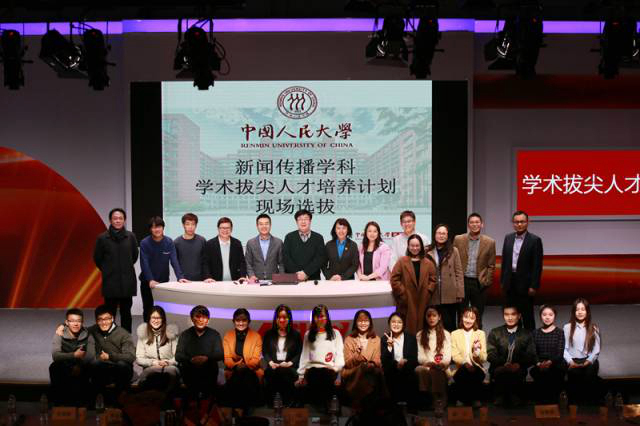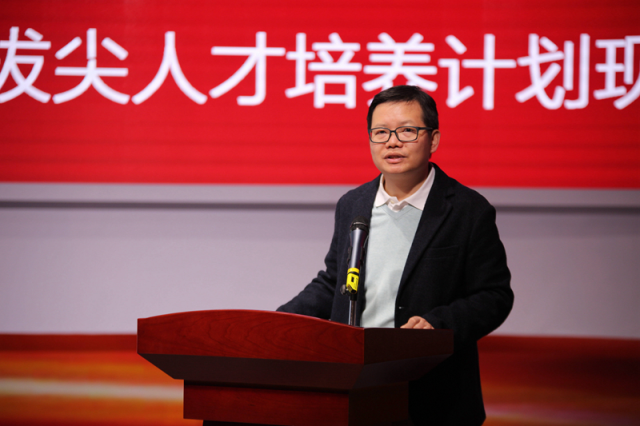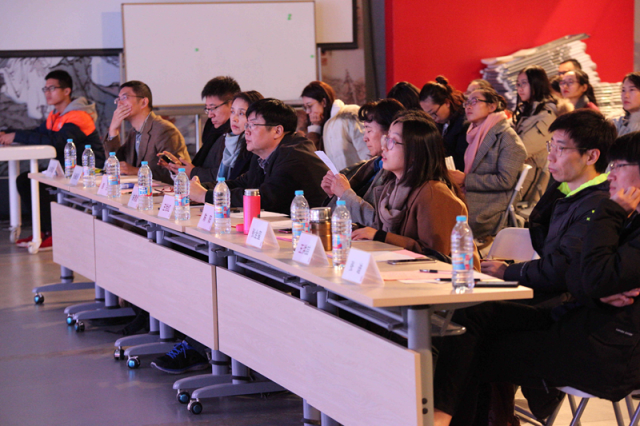The first selection of the program for top-notch academic talent cultivation launched by the School of Journalism of Renmin University of China was held on December 8th. Four students were selected in the university-level program; and nine for the school-level program. All of them will receive funding from schools and colleges to conduct research.

The selection was conducted in three rounds: public interviews, differential selections, and results announcement. It attracted 18 candidates, from undergraduates to Ph.D. The applicants first displayed their research plan in 10 minutes, answered the questions asked by the judges within 5 minutes, and finally, the selection committee scored the applicants and announced the final results.

Zhou Yong, Associate Dean of the School of Journalism, introduced the cultivating plan
Hu Baijing, Executive Dean of the School of Journalism, and Zhou Yong, Associate Dean of the School of Journalism, together with nearly 100 teachers and students, were present. Zhou Yong introduced that the program for top-notch academic talent cultivation has provided resources and related support from schools and colleges and encouraged students interested in academic research to enter the normative academic research as soon as possible. At the same time, it is hoped that a continuous and stable talent cultivating mechanism will be established via this plan.
The selection committee consists of the experts from RUC and other universities, but candidates’ mentors excluded. Professor Liu Hailong served as the chairman. The experts from other universities include Professor Peng Lan from the School of Journalism and Communication, Tsinghua University, Wang Yihong, Researcher at the Institute of Journalism and Communication, Chinese Academy of Social Sciences, Zhang Qiang, Professor from the Communication University of China, and Wang Hongyu, Assistant Professor of the School of Journalism and Communication, Peking University. The experts from the School of Journalism, Renmin University of China, include Professor Song Jianwu, and Associate Professors, Chen Yang, Zhang Di, and Zhang Jinyu.

In order to promote more outstanding doctoral students to engage in high-level scientific research and innovative research, the Ph. D students in their second year in RUC with academic potential, can be selected in the program for top-notch academic talent cultivation, and receive a three-year subsidy from the university, with 10,000 RMB for the first year, 20,000 RMB for the second year, and 20,000 RMB for the third year. In the second and third year, their tutors will also be given a grant of 10,000 RMB per year.
While the students selected in the school-level program will be given 10,000 RMB as financial support annually. To be specific, senior students will receive altogether 10,000 RMB from the fourth grade to their first-year graduate study to conduct academic research; and postgraduates and doctoral students will receive 10,000 RMB each year. School of Journalism and Communications of RUC will offer tutors and platform to them.
“Adopting public interviews to select students is quite demanding. But on the one hand, it has guaranteed an open and fair result; on the other, it has offered me a good opportunity to learn from other competitors’ performance. Besides, experts’ advice is practical and can inspire me in improving my research design and research methods.” said one of the applicants Zhao Xinning, a doctoral student at RUC since 2016.
Doctoral student He Tianping said, “Its special form seems like an academic ‘show’, but it requires contestants’ ability to cope with stress as well as their flexibility, especially in the Q/A part.” He also suggested other students who are aspired to conduct academic research to develop their interest in and passion for academic research. “Because passion and interest are the motivators to further one’s research,” said He.
Some special guests also give their opinions on this activity. “The overall performance of the applicants’ is excellent, they have shown us their outstanding academic accomplishments, wide horizon and academic pursuit. It’s also advisable for them to present their research results as a teamwork. Interdisciplinary cooperation is encouraged to input refreshing factors,” said Peng Lan, a journalism professor at Tsinghua University.
Wang Yihong, researcher at the Chinese Academy of Social Sciences, said “The activity has an open and transparent procedure to select the top academic talents. It has ensured the fairness and transparency of the procedure. Top-class academic talents should have the following qualities. First, they should have the courage to explore the truth and not to fear failure; second, they should have good communication skills. The applicants communicated actively with judges. Their performance reflects RUC students’ wisdom and wisdom.”
Zhou Yong, deputy dean of Department of Journalism and Communications, explained why they had “open” interviews, “First, its transparent procedure can be guaranteed. Second, addressing the public and defending their thesis can test competitors’ flexibility and their understanding towards their research projects. Also, open interviews mean all of the students can participate in this activity. It’s also an important factor for RUC to set up world-class universities and world-class disciplines.
Mr. Zhou also gave suggestions to students who want to do academic research in the future, “Academic activities can never be regarded as shows. It needs us to stay down-to-earth and make gradual efforts. At the same time, it needs passion. But remember, passion doesn’t equal impulsion. Motivation should come from the joy of thinking; it should be felt when people calm down. Those who do great things can also enjoy the happiness of everyday life. A good scholar should have aspiration, persistence and moral quality.
Name List of the Selected Students:
University-level program:
He Tianping, the Ph.D. students of year 2016
Wang Yang, the Ph.D. students of year 2016
Zhao Rui, the Ph.D. students of year 2016
Zhao Xinning, the Ph.D. students of year 2016
School-level program:
Yang Haohe, the Ph.D. student of year 2016
Wu Xinwei, the Ph.D. students of year 2017
Shu Kairong, the Ph.D. students of year 2017
Wang Xuezheng, the Ph.D. students of year 2017
Hao Junyi, the graduates of year 2016
Yan Xiaomeng, the graduates of year 2016
Yu Wei, the graduates of year 2016
Li Shuwen, the undergraduates of year 2014
Cao Peyue, the undergraduates of year 2014



